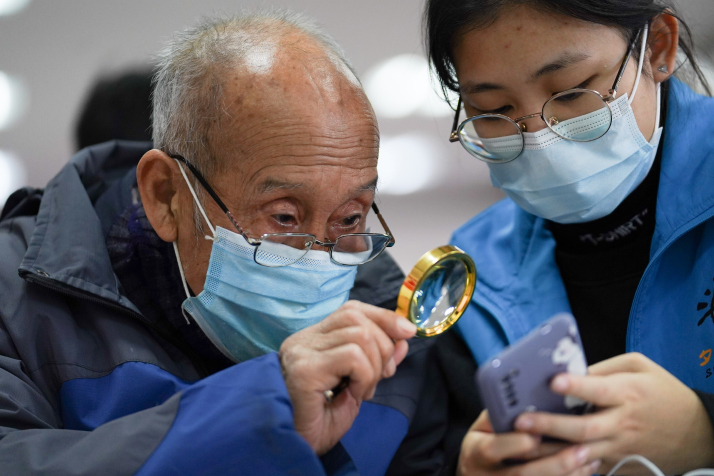| China |
| With a new profession and technological advancement, patients will be less lonely seeing a doctor | |
|
|
 A volunteer teaches a senior resident how to register for hospital services online using a smartphone in Beijing on December 8, 2020 (XINHUA)
In 2017, when Liu Shanshan, then 32 years old, was asked to accompany an elderly family member to see the doctor, she had no idea that request would lead her into a new profession. The senior patient came from a neighboring county to Shenyang, capital of Liaoning Province, where Liu lived, to visit a larger hospital which boasts better medical resources than those in his hometown. He was initially accompanied by his daughter, but she was later called up by her company for an emergency so she had to leave Shenyang and entrust Liu to take care of her father. The entire week of accompanying her senior relative, going through tedious formalities and treatment procedures, made Liu realize the challenges that come with taking care of senior citizens in an increasingly aging society. So she decided to do something about it. After much market research and making all other relevant preparations, Liu and her husband started a company focusing on elderly care services. Last year, the company began providing companion services to assist patients with their hospital visits, including running errands such as picking up their medicines and medical examination reports. She has thus become a professional "patient companion," an emerging occupation that has recently triggered hot debate among netizens. Some welcome such services while others have their reservations because they still hesitate to trust strangers with their nearest and dearest and think the industry still needs development and regulation. "I know how difficult it can be and how important it is to take good care of the elderly people in the family because I am a daughter, too. Empathy inspired me to run the business and help those in need," Liu told Beijing Review. A companion Liu's company, An An Pei Zhen, has served hundreds of customers. About 75 percent of those who received the companion service were senior citizens whose children were unable to accompany them to the hospital. Many of them were like Liu's relative, people who travel to bigger cities from neighboring small counties in search of better medical resources. Sometimes the children would turn to other relatives for help, but frequently asking favors made them uneasy. Paying for professional services is an alternative to this. The elderly whose children are unable to take care of them are not the only people who require hospital companion services. Younger ones who work and live alone outside their hometowns also need such services, especially under special circumstances that they do not want to inform their kin such as having to terminate a pregnancy. "Some patients want to keep their condition a secret, while others like to vent their life's miseries. Our patient companions will serve as quiet listeners and keepers of secrets," Liu said. Liu added that the most important requirements for hospital companions are patience, a good knowledge of local hospitals and the services they offer, and abundant time, especially during weekdays. In keeping with the principle of "service overrides all else," the company has attracted a large number of returning customers as well as their friends and family members. Now, Liu wants to focus more on providing training for those who are new to this business. With hundreds of previous case studies and additional industrial research, her company provides training plans that cover a wide array of details, such as packing spare masks for those who might lose theirs or candy for those who will have to get blood tests, in addition to basic services. She also receives calls from peers all over the country seeking knowledge. Liu and other hospital companions encountered a number of difficulties. A salient one is that some elderly who had maintained a frugal lifestyle for as long as they could remember thought their services would be a waste of money and refused to go with them, even with a companion waiting at their door. Another difficulty is a lack of in-depth understanding of the industry. Hospital staff, often for security concerns, often ask questions or simply refuse to let them handle the formalities on the patients' behalf. "I hope the industry will develop and more people, including patients and hospital staff, can grow to accept it," Liu said. Some residential communities also have social workers on call to provide similar services for senior citizens. For example, the Cuiling subdistrict office in Shenzhen has set up archives for the elderly in need in the area following several home visits. It has also organized a team of volunteers to offer them assistance similar to that of hospital companions.  People use online registration systems at a hospital in Hangzhou, Zhejiang Province, on January 20 (XINHUA)
Going digital Some hospitals have applied advanced technology to help those who have to see their doctors alone. Shanghai General Hospital recently launched an online service to enable family members to accompany patients remotely. By registering as a patient caretaker on the hospital's official WeChat account, people can get notifications on their phones regarding the patient's hospital visit. Additionally, the hospital will send a video link via which family members or any other registered caretakers can participate in the entire process of examination and communicate with both patient and doctor. Registered caretakers can also check the patient's electronic medical records, prescriptions, hospital reports, and bills. The service was launched based on the hospital's research, according to Zheng Xingdong, President of Shanghai General Hospital. Since the service became publicly available in May, some 9,000 children or relatives of patients have registered as health managers. The combination of online and offline services not only ensures patients receive the most efficient consultation and treatment, "but also enlarges the scope of physicians' services, better meeting patients' needs," Chai Shuang, head of the Patient Experience Department of the hospital, told ThePaper.cn. Improvements needed Liu said according to her market research, the hospital companion service first emerged around 2015, but initially encountered a lack of public understanding. With an increasingly aging population, it has recently received more public attention. However, as an emerging occupation, it still faces some challenges. For instance, the relevant regulations are not adequate. Moreover, Liu said some people want to be companions to make a fast buck rather than become fully involved in and devoted to this emerging industry. Since the hospital companion has not been included in the official occupation catalogue, its service scope mainly depends on the agreement between the service purchaser and provider. It is necessary to have regulations that clarify the relevant legal responsibilities, especially in case of an emergency. Therefore, professional norms and related measures need urgent improvement, according to Chen Cheng, a professor at the Law School of China University of Labor Relations. "There is a need for the strict review of practitioner qualifications as well as for the formation of a filing system for institutions and personnel. Moreover, it is necessary to train hospital companions to enhance their abilities and professional ethics. Last but not least, regulations should be in place to stipulate their rights and responsibilities," Chen told Workers' Daily. (Print Edition Title: At Your Service) Copyedited by Elsbeth van Paridon Comments to luyan@bjreview.com |
|
||||||||||||||||||||||||||||||
|